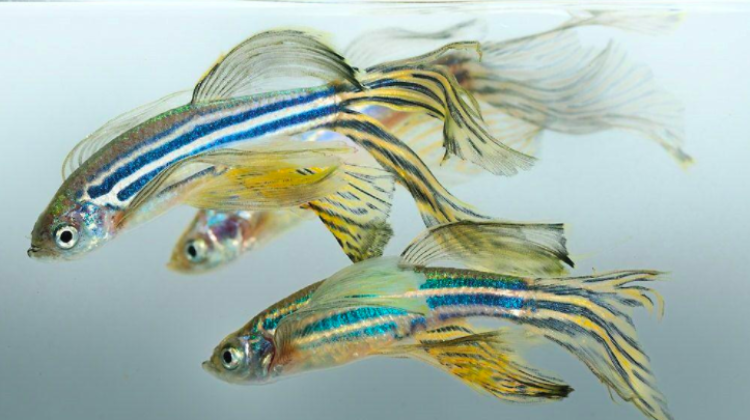Zebrafish - a small fish that helps understand human diseases
 Photo: Michał Bazała/MIBMiK
Photo: Michał Bazała/MIBMiK
Inconspicuous zebrafish can successfully replace mice or rats in experiments. It currently helps researchers understand the genetic background of scoliosis and the mechanisms of drug addiction, experts said at a press conference in Warsaw.
Zebrafish is a small fish that - like fruit flies, mice and rats - is a popular model organism used in science. Research on these animals helps understand the mechanisms of various diseases and develop new therapies. This is possible because about 70 percent human genes have their counterparts in the fish genome.
Prof. Jacek Kuźnicki explained at a press conference organized at the International Institute of Molecular and Cell Biology in Warsaw that a great advantage of zebrafish is that it allows to carry out research on a much larger scale than mammals do. "Experimenting with tens of thousands of chemical compounds is impossible to imagine in the case of mice or rats" - he said. Meanwhile, using zebrafish allows to select two or three drug candidates from among several dozen thousands compounds in just a few months.
Scientists from around the world exchanged experiences from zebrafish research at the international scientific conference "2nd International FishMed Conference on Zebrafish Research" in March in Warsaw.
An example of currently carried out zebrafish research is the search for genetic determinants of scoliosis. This disease is very common, but surprisingly - despite the amazing development of genetics - we basically do not know what its causes are, which genes are responsible, said Prof. Lilianna Solnica-Krezel from Washington University School of Medicine (USA), chairwoman of the scientific committee of the conference.
Prof. Solnica-Krezel said that researchers in her laboratory were carrying out large scale genetic tests, for they needed tens of thousands of fish. It would take several years, but they were already finding the genes responsible for scoliosis. Scientists consult their results with human geneticists. This allows to check whether the genes they have identified are also responsible for human scoliosis.
Collaboration between scientists working with fish and those who focus on people is very active. Solnica-Krezel believes it will allow to discover the genetic background of scoliosis.
Randall Peterson from the University of Utah (USA) does not use genetic methods. In his new project, of which he spoke at the conference, he explores the mechanisms of drug addiction. It turns out that fish can become addicted to drugs. Scientists are starting to look for chemical compounds that will prevent this addiction in fish. This could lead to the discovery of new drugs.
Experts emphasise that zebrafish research is becoming more popular in Poland. Laboratories working with this fish already exist in Warsaw, Wrocław, Lublin and Kraków. The first Polish zebrafish breeding facility was created in 2012 at the International Institute of Molecular and Cell Biology in Warsaw. It was financed under the FishMed project, financed by the European Commission and the Ministry of Science and Higher Education.
"We are slowly becoming a partner in zebrafish research for our colleagues abroad. We were learning before, now we are moving on to a partnership system" - concluded Prof. Jacek Kuźnicki.
PAP - Science in Poland
author: Katarzyna Florencka
kflo/ ekr/ kap/
tr. RL
Przed dodaniem komentarza prosimy o zapoznanie z Regulaminem forum serwisu Nauka w Polsce.















